Student Blog
Admissions
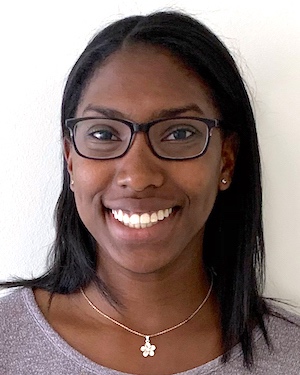
Getting Ready for the Big Exam ⟩
July 12, 2019, by Anijah
Admissions
Hi Everyone!
There are ONLY two months left in the last summer of my undergraduate career. In the month since I finished the school year, I have accomplished a lot. However, there is still so much more that I need to do.
In this last month, I have traveled to Paris, worked my normal student job, and also worked in the Occupational Therapy (OT) department. The insight and the relationships that I have formed by working in OT have been invaluable. When I began this summer, I was not sure as to how I would pursue my passion for working in this field (should I take a gap year or immediately pursue a graduate degree in OT). I decided to pursue a graduate degree, with the first step being to take the Graduate Records Exam (GRE).
Before I take the GRE I have decided to prep for the exam. After I decided that I did not want to take a gap year between graduation and the start of OT school, I decided that the summer before my senior year I would study for the exam. Here are some tips I have, as I get ready to take the GRE, for other students that are also preparing to take the GRE:
- The first step is to select your test date on the official GRE testing website: https://www.ets.org. Depending on how much time you want to give yourself to prep for the exam, you can select the test date and test location on this website.
- Next is the preparation stage. We all have different ways to study, whether that be listening to an instructor in person, watching videos on topics, or using online tools to help you prepare. I am the type of person who learns better with videos that explain a specific type of question or general idea. For that reason, I choose a GRE prep system that gives me that freedom, and there are a variety of different ones to choose from. I recommend testing out different prep tools to determine what works best for your learning style and time frame for preparation.
- Now that you have found the right prep course, you can create a study plan that you intend on following. You can either create your own or use ones that are already created. The prep system I use, Magoosh, provides a variety of study plans depending on if you would like to study daily or weekly. You also get to choose if you are studying for only one week or 2-3 months. It is beneficial for someone to have a study plan when reviewing for the GRE because it is a lot of information. The structure of a study plan allows a person not to feel overwhelmed and breakdown topics for the person’s understanding.
- When developing your study plan build in a cushion. The cushion is because as you go through this process life is still happening; things outside of your plan may need to be handled and you may need to review topics longer than originally anticipated to get a clear understanding. Do not beat yourself up if your plan needs to be adjusted. Without a plan, there is nothing to adjust. That is when it becomes a free fall.
- Now that you have developed and worked your plan, it is test time. Remember that you are prepared and ready. You Got This!
I hope these tips will help anyone who is thinking about taking the GRE. There are a lot of resources and tools for the GRE that may be beneficial for you. Find the right one for you. As always, Fight On!
⋯

What USC has done for me (so far)? ⟩
May 24, 2019, by Anijah
Admissions
For a very long time I was unsure about what I wanted to do for my future, but what I did know was that I wanted to attend an amazing university located near my family. The first time I applied to USC I did not get accepted, so I had to decide if this university was what I truly wanted. My twin sister and I soon realized that we definitely wanted to attend USC, so we decided to go through with the Trojan Transfer Plan. Ever since I entered high school, I always had the idea that I would attend a four-year university right after graduation, but I believed I would be most successful at a community college first. I attended a CC where I could compete in track and field while completing the necessary steps to transfer to USC. After one amazing year in Sacramento, CA, my sister and I both got into the university of our dreams, USC.
Transferring into a university can be difficult for many reasons, and it can be even more stressful when you are indecisive about what you want to do. I had always participated in sports, so I believed it would be good to get a degree in Human Biology. With that degree, I could go to physical therapy school. I was nervous to switch my major because it is a huge step in any college student’s life when they do so. While switching my major, I also added on a minor in occupational therapy because it is a healthcare profession that worked closely with physical therapists. My first occupational therapy class discussed how occupations allow people to experience a healthier life. USC is one of the few universities to offer undergraduates the opportunity to learn more about this amazing field as a minor.
Halfway through my first semester at USC, I started to realize that I enjoyed the field of occupational therapy. After doing some research, I found myself at one of the information sessions that the OT division offers. Immediately, I noticed how this graduate program accepted people from all educational backgrounds. After attending the session, I met with my advisor so that I could get on track to attend graduate school for occupational therapy. Deciding to transfer to the University of Southern California was a great decision because I truly believe I would have never found such an amazing career!
⋯
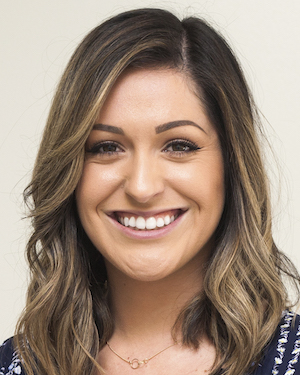
Senioritis . . . Senioritis Everywhere ⟩
February 20, 2019, by Melissa
Admissions
Hey everyone! This is our last semester in the program, and things definitely haven’t slowed down. As a result, I’ve realized that a common theme amongst our class is exhaustion and senioritis. After I graduated from undergrad, I thought that senioritis was a thing of the past, but boy oh boy was I mistaken. Don’t get me wrong, I’m still enjoying my time in the program tremendously, and taking electives this semester keeps things interesting, but I am also feeling the burnout. Thus, I wanted to share some of the things that help to keep me going!
Clinical opportunities and seeing OT in action
Although there is no Level 1 fieldwork associated with our Spring Semester, we still have the opportunity to shadow OTs in specific settings depending on the electives we choose to take. I talk more in depth about these opportunities in my previous blog post, so check it out if you’d like to learn more. Getting the information we need during class is always great, as our professors are incredibly knowledgeable and they are experts in their given area of study, but there’s something invigorating about being able to see it play out in a clinical setting. For example, we learn all about the difficulties associated with treating medically fragile patients up the hill at Keck Hospital, but having the opportunity to see what that looks like is hugely beneficial to my learning. It also helps to remind me why I chose to be in this profession, as the OTs we shadow are GREAT at what they do, and the patients truly appreciate them.
Meeting with my Mentor
USC does a great job of providing us with opportunities for mentorship, and we are often encouraged to seek out faculty or staff that we think would offer mentorship in an area we are interested in. I myself have sought mentorship from several faculty and staff members, and I can happily say that we are still in contact today. However, apart from being encouraged to approach mentorship on our own, our program actually assigns us a mentor depending the area of study we’d like to pursue! I personally love the mentor I was assigned, and I am truly grateful that clinicians, faculty, and staff all take the time to mentor us. Things aren’t always going to be rainbows and sunshine, and having someone that I can go to when things get rough is truly comforting.
In addition, I have been lucky enough to work alongside 2nd year and OTD students throughout my time in the program, and they have provided great mentorship as well. As students who are ahead of you in the program, they can offer some great information on what to expect, and even some tips based on their own experiences! I’ve found it really beneficial to have a student perspective as well. Ultimately, seeking mentorship from leadership within the program or students that are ahead of you will help to ease your anxiety, and it can help with your own career planning!
Assisting with interviews for the incoming Ambassadors
This has been a particularly fun experience, as it reminds me that not too long ago I was also going through this process and hoping to be a part of the Ambassador team! It was so refreshing to see the passion, commitment, and talent in our program, and we had some very strong candidates. This position is something I knew I wanted to pursue even before I started in the program, therefore interviewing the incoming ambassadors reminded me of the excitement and NERVES that surround the application process. Now that my time as an ambassador is nearing its end, the interview process has prompted me to reflect on everything we’ve done, and all that we’ve accomplished these past months. It’s easy to get wrapped up in the chaos of everyday life, therefore taking a step back to appreciate these last two years has helped me get the energy to push through the last couple of months in the program.
Admitted Student Reception
For those that don’t know, there is an Admitted Student Reception that we host in the spring to welcome all of our admitted students. It’s such an exciting, emotional, and invigorating experience, and serves as a great opportunity to meet your future classmates and professors! I personally had such a great time, and getting to experience it again last year and this year reminds me of the excitement surrounding our admission into the program! Working the event and meeting the newly admitted class is so fun, and I find it hard to believe that my time as a Master’s student is almost over. It’s a surreal feeling, but it serves as a reminder to enjoy the time I have left!
Ordering our regalia for Graduation!
We were recently notified that we could begin to order our regalia and sashes for graduation! Although graduation is a little over 2 months away, it’s exciting to begin to plan for it. It definitely makes it feel more real, and it’s a reminder that we’re so close to the finish line. We also get to personalize our sash if we want to, which makes the process more fun! Because this semester has been so busy, it’s hard to remember that it’s not an ordinary semester, but our last one! Even that small reminder has been enough to excite me to push through the rest of the semester and finish strong.
Being tired and feeling burnt out is not a bad thing. It’s just a sign that you’ve been working really hard for a while! However, it is important to take some time to reflect and remember why you started. It’s crazy to think about how quickly my time in the program has gone by, and I’m excited to push through these upcoming months to walk the stage with my classmates!
⋯
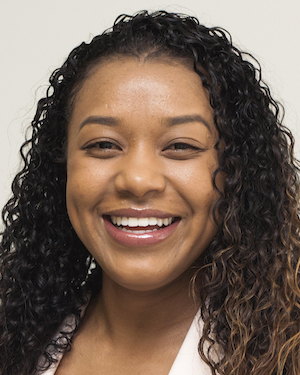
Black College Expo ⟩
February 5, 2019, by Serena
Admissions Diversity
Increasing diversity within the OT profession at the Black College Expo!
What a great way to start off Black History Month! Last year I attended the 2018 Black College Expo, a couple of months ago I attended the Latino College Expo, and this past weekend I was at the 2019 Black College Expo! The annual event is held at the LA Convention Center to increase Black students’ awareness of and acceptance into higher education. It was an honor and joy to be able to mentor college, high school, middle school, and even elementary school students at such a life-changing and well put on event! So many incredible memories were made today, one of which I would love to share about a very bright 4th grader I met.
Future OT: At the age of 9
As I saw a little girl approach the USC OT booth, I immediately became very excited! I mean, I wish someone would have told me about OT while I was in elementary school. I asked her, “Do you know what Occupational Therapy is?” And she replied, “No.” So I then asked, “What do you like to do?” And she said, “I like to play on my iPad.” And I said “Well, if you were to get sick and not be able to play on your iPad then occupational therapists would help you play on your iPad.” She instantly grabbed an OT flyer and clipped an OT pin to her jacket.
After I gave her a more in depth description of OT, she left . . . and then quickly came back with her dad. By the end of the conversation we had planned for her to tour USC’s Health Science Campus to learn more about OT and the various fields of healthcare at the young age of 9!
Thank You!
I am so grateful for events such as the Black College Expo for allowing me to have these wonderful experiences and for having USC’s Occupational Therapy and Occupational Science program in attendance. The other OTs and student ambassador present made the experience that much more special by spreading their love for OT. By attending, we were of course having a great time and helping students find their passions, while addressing AOTA’s Vision 2025 by working on one of the 5 pillars, diversity.
Looking forward to next year!
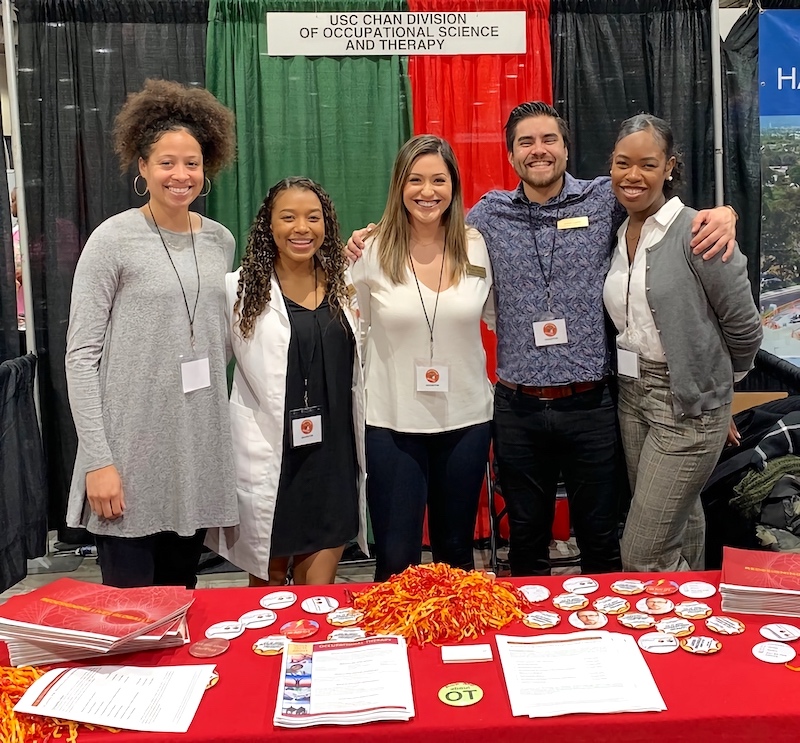
USC occupational therapists and occupational therapy student ambassadors at the Black College Expo Event at the Los Angeles Convention Center. From left to right: Natasha Strickland (OTD student), Serena Hobson (me), Melissa Martinez (student ambassador), Diego Lopez (OTD student), and Laryssa Green (OTD student).
⋯
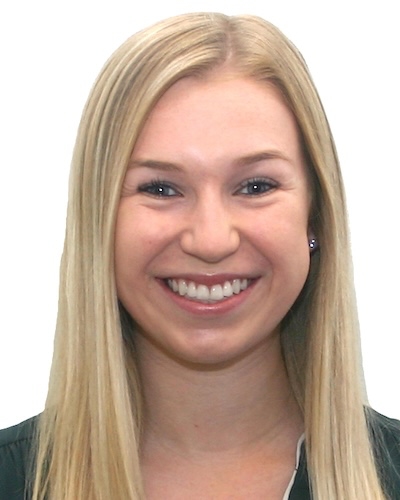
3 Ways to Pursue OT as an Undergrad ⟩
February 4, 2019, by Jessica P.
Admissions Life Hacks
As many of you know, to practice as an occupational therapist in the United States you need a master’s degree. So that leaves a lot of people wondering — how do I get involved as an undergrad to prepare myself to become an occupational therapist? At USC as an undergrad, there are many ways to pursue occupational therapy from the minute you step on campus as a freshman:
1. Major in Occupational Therapy
If you know as a high school student applying to college, you want to pursue occupational therapy as a career then our Bachelor to Master’s (BS-MA) in Occupational Therapy is the major for you! The accelerated BS-MA program is a program where you get your undergrad and master’s degrees in just 5 years, instead of the traditional 6 years. The program follows a 3 + 2 format where your first 3 years you complete your undergrad courses and the last 2 years you complete your master’s courses.

During your undergrad years, you complete pre-professional courses as well as general education courses that all USC students take. Many students wonder if they can still have the “typical” college experience while being in an accelerated program, and let me tell you — you definitely can! As a BS-MA student, I was able to still take courses abroad, pick up a minor, while also participating in Greek life and student organizations.
2. Minor in Occupational Science
If you are an undergrad at USC, but aren’t already majoring in Occupational Therapy, you can join our amazing Occupational Science minor. Occupational Science was founded at USC in 1989. The OS minor classes are designed to complement any major and enhance students’ understanding of occupations, the things we do every day that occupy our time. There are students who are in a variety of majors such as accounting, chemistry, and theater, in addition to students who are planning on pursuing occupational therapy as their career.
There are classes like OT 310: Creativity Workshop where you get to explore your own creativity, OT 340: Occupational Foundations of Human-Animal Interaction which focuses on how animals contribute to human health, OT 350: Disability, Occupations, and the Health Care System where you learn about occupational opportunities and barriers in the health care system, and many more. Requiring only 20 units, the OS minor is flexible to fit into any undergrad’s schedule and provides classes that are hands-on and fun!
3. Join the Pre-OT Club
The Pre-OT club is a great way USC undergrads interested in occupational therapy can get involved. The club frequently has speakers come to present on topics such as neurodiversity, graduate admissions, and the health care field in general. They also hold site visits in the Los Angeles area to see various areas of practice and shadow clinicians.
No matter where you are on your path to pursue occupational therapy, USC has ways for you to explore whether this is the right field for you.
⋯





